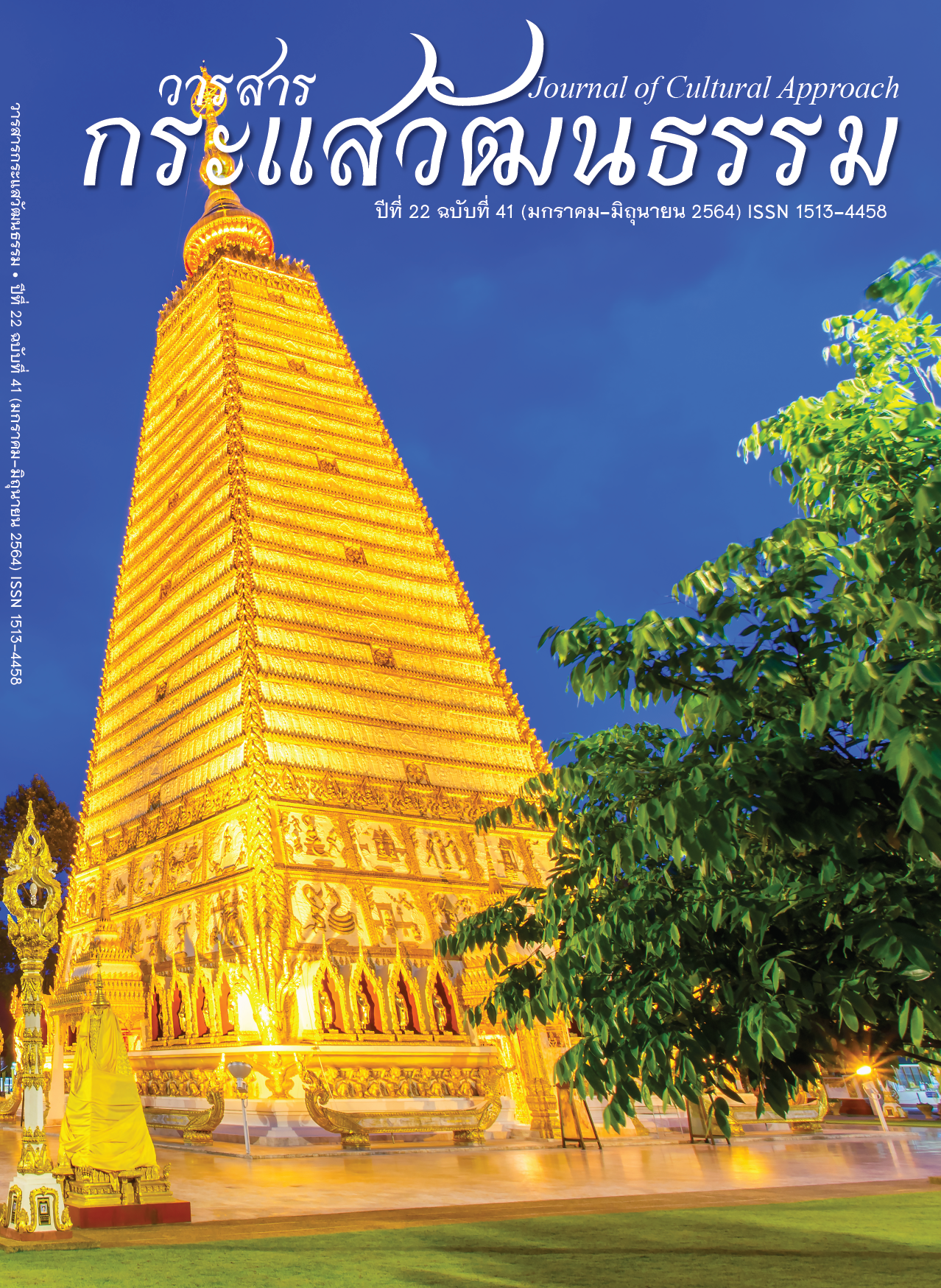การท่องเที่ยวเพื่อการเรียนรู้ด้านอาหารในฐานะนวัตกรรมในการพัฒนาชุมชนอย่างมีส่วนร่วมและการนำไปสู่การปฏิบัติ
Main Article Content
บทคัดย่อ
งานวิจัยนี้มีวัตถุประสงค์เพื่อนำเสนอรูปแบบนวัตกรรมการจัดการท่องเที่ยวเพื่อการเรียนรู้ด้านอาหารที่กระตุ้นการมีส่วนร่วมของชุมชนของชุมชนปงถ้ำ อำเภอวังเหนือ จังหวัดลำปาง ราชอาณาจักรไทย เป็นงานวิจัยที่ใช้รูปแบบการวิจัยเชิงปฏิบัติการแบบมีส่วนร่วม (PAR) เทคนิค AIC โดยใช้เครื่องมือคือการประชุมกลุ่มย่อย การสัมภาษณ์เชิงลึก การสังเกตแบบไม่มีส่วนร่วม และการสัมภาษณ์อย่างไม่เป็นทางการ โดยมีกลุ่มประชากรในครั้งนี้จำนวน 72 คนที่เข้าร่วมกิจกรรมครบกระบวนการ ผลการวิจัยพบว่านวัตกรรมการจัดการท่องเที่ยวเพื่อการเรียนรู้ด้านอาหารที่กระตุ้นการมีส่วนร่วมของชุมชนของชุมชน มีการขับเคลื่อนสองส่วนหลักคือ 1) นวัตกรรมจากกิจกรรมท่องเที่ยว (ITA) และ 2) นวัตกรรมจากการจัดการท่องเที่ยว (ITM) โดยทั้งสองทำงานสอดประสานกัน ส่วนการทำนายกิจกรรมการท่องเที่ยวเพื่อการเรียนรู้ด้านอาหารที่สามารถกระตุ้นการมีส่วนร่วมของชุมชนมากที่สุดคือ กิจกรรมขันโตกดินเนอร์ ตามด้วยกิจกรรมสาธิตทำอาหารชุมชน และกิจกรรมเรียนรู้สมุนไพรจากปราชญ์ชาวบ้าน ตามลำดับ
Article Details

อนุญาตภายใต้เงื่อนไข Creative Commons Attribution-NonCommercial-NoDerivatives 4.0 International License.
Proposed Creative Commons Copyright Notices
1. Proposed Policy for Journals That Offer Open Access
Authors who publish with this journal agree to the following terms:
- Authors retain copyright and grant the journal right of first publication with the work simultaneously licensed under a Creative Commons Attribution License that allows others to share the work with an acknowledgement of the work's authorship and initial publication in this journal.
- Authors are able to enter into separate, additional contractual arrangements for the non-exclusive distribution of the journal's published version of the work (e.g., post it to an institutional repository or publish it in a book), with an acknowledgement of its initial publication in this journal.
- Authors are permitted and encouraged to post their work online (e.g., in institutional repositories or on their website) prior to and during the submission process, as it can lead to productive exchanges, as well as earlier and greater citation of published work (See The Effect of Open Access).
Proposed Policy for Journals That Offer Delayed Open Access
Authors who publish with this journal agree to the following terms:
- Authors retain copyright and grant the journal right of first publication, with the work [SPECIFY PERIOD OF TIME] after publication simultaneously licensed under a Creative Commons Attribution License that allows others to share the work with an acknowledgement of the work's authorship and initial publication in this journal.
- Authors are able to enter into separate, additional contractual arrangements for the non-exclusive distribution of the journal's published version of the work (e.g., post it to an institutional repository or publish it in a book), with an acknowledgement of its initial publication in this journal.
- Authors are permitted and encouraged to post their work online (e.g., in institutional repositories or on their website) prior to and during the submission process, as it can lead to productive exchanges, as well as earlier and greater citation of published work (See The Effect of Open Access).
เอกสารอ้างอิง
Cohen, J. M. & Uphoff, N. T. (1977). Rural Development Participation: Concept and Measures for Project Design Implementation and Evaluation. Rural Development Committee Center for International Studies, Cornell University.
Dahrendorf, R. (1959). Class and Class Conflict in Industrial Society Vol.15. California: Stanford University Press.
Deshler, D. & Sock, D. (1985). Community Development Participation: A Concept Review of the International Literature. International League for Social Commitment in Adult Education, 22-26.
Hall, C. M., Sharples, L., Mitchell, R., Macionis, N. & Cambourne, B. (2003). Food Tourism around the World: Development, Management and Markets. Oxford: Butterworth–Heinemann.
Holman, D., Pavlica, K. & Thorpe, R. (1997). Rethinking Kolb’s Theory of Experiential Learning in Management Education: the Contribution of Social Constructionism and Activity Theory. Management Learning, 28(2), 135–148.
Kowit Puongngam. (2009). Participatory Process. Bangkok: Mr.Copy.
Long, L. (2003). Culinary Tourism. University Press of Kentucky.
Manager Online. (2017). Policies on Thailand 4.0. Retrieved from http://www.manager.co.th/daily/viewnews.aspx?NewsID=9590000096362
Maxwell, J. A. (2012). Qualitative Research Design: An Interactive Approach Vol.41. Sage Publications.
Ministry of Tourism and Sports. (2016). Tourism Situations in Thailand. Bangkok.
Pannathat Kalaya & Kanok–orn Sirithiti. (2019). Tourism Management for Food Learning to Be An Innovation in Development Local Community Participation of Ban Pong Tham Wang Nuea District, Lampang Province. Journal of MCU Nan Review, 3(2), 53–67.
Pranee Thongkham. (1996). Educational Instrumentation. Pattani: Prince of Songkla University Publishing House.
Ranee Esichaikul. (2014). Niche Tourism. Sukhothai Thammathirat Open University.
Sanya Sanyawiwat. (1991). Sociology. Chulalongkorn University.
Tourism Authority of Thailand. (2017). Food on the Move. TAT Review, 3(1), 8–20.


